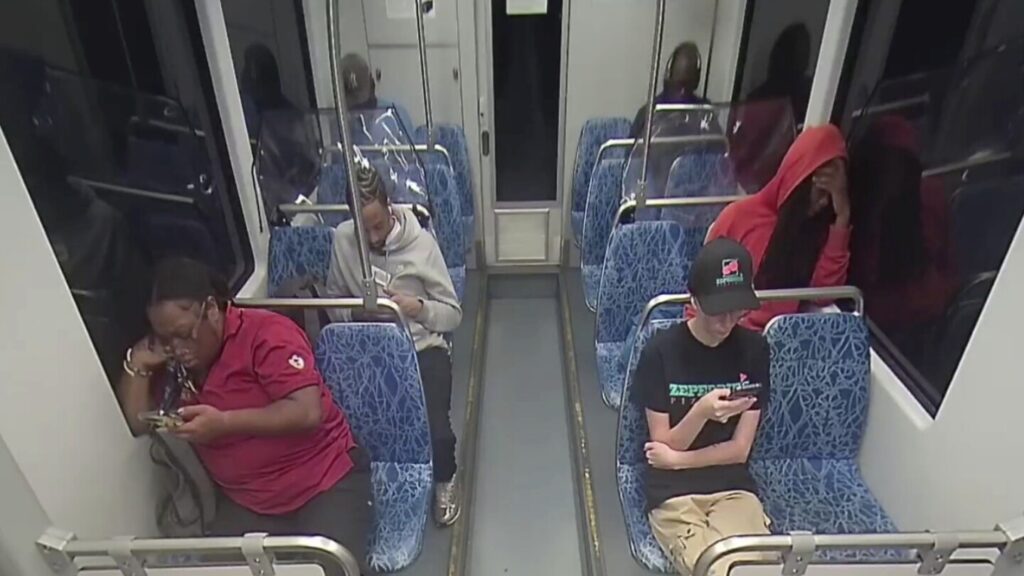On August 22, 2025, a horrific event unfolded on Charlotte’s Lynx Blue Line light rail, leaving passengers on the light rail and the community in shock. Iryna Zarutska, a 23-year-old Ukrainian refugee who had fled her war-torn homeland for a safer life in the United States, was fatally stabbed in an unprovoked attack. The suspect, 34-year-old Decarlos Brown Jr., has been charged with first-degree murder, sparking intense debates about public safety, mental health, and crime prevention on public transit systems. This tragic incident, captured on surveillance video, has sent ripples through Charlotte, North Carolina, and beyond, raising questions about how such a senseless act could occur in a place meant to be safe for commuters.

The Incident: A Night of Horror on the Lynx Blue Line
At approximately 9:46 p.m. on August 22, 2025, Iryna Zarutska boarded a Lynx Blue Line light rail train in Charlotte’s South End, a bustling neighborhood known for its vibrant nightlife and accessibility via public transit. Wearing a black T-shirt and cap from Zepeddie’s Pizzeria, where she worked, Zarutska sat down, engrossed in her phone, unaware of the danger behind her. Seated directly behind her was Decarlos Brown Jr., a man who, according to police affidavits, had no prior interaction with her. Surveillance footage, later released by the Charlotte Area Transit System (CATS) on September 5, captured the chilling sequence of events.
Just four minutes after Zarutska boarded, at around 9:50 p.m., Brown pulled a folding knife from his pocket. Without warning, he stood, lunged forward, and stabbed Zarutska three times, at least once in the throat. The attack was swift and brutal, leaving Zarutska with no chance to defend herself. She clutched her throat, collapsed, and was pronounced dead on the Light Rail train. Brown, showing little emotion, walked to the front of the light rail train car, removed his red-orange sweatshirt, and exited at the next stop, where police apprehended him. A folding knife, believed to be the murder weapon, was recovered near the platform.
Passengers on the Light Rail train were left in a state of shock and panic. Some rushed to Zarutska’s aid, with one heroic bystander attempting CPR and using his shirt to stem the bleeding. Despite their efforts, Zarutska could not be saved. The surveillance video, edited to exclude the graphic moment of the stabbing out of respect for the victim’s family, has been widely discussed, with media outlets like WBTV and CNN providing detailed accounts of the timeline.
This tragedy has not only devastated Zarutska’s family and friends but also raised urgent questions about safety on public transit. For more on public safety concerns in urban areas, check out our article on Urban Safety Challenges in 2025.
Who Was Iryna Zarutska?
Iryna Zarutska was a vibrant 23-year-old who had fled Ukraine in 2022 with her mother, sister, and brother to escape the Russia-Ukraine war. Settling in Charlotte, she embraced her new life with optimism, working at Zepeddie’s Pizzeria and pursuing her education at Rowan-Cabarrus Community College from 2023 to 2025. Described by loved ones as having “a heart of gold,” Zarutska was a talented artist with dreams of becoming a veterinary assistant. Her obituary, as reported by CNN, highlighted her resilience and hope for a peaceful future in the United States.
Zarutska’s story resonates deeply, as she represented the promise of a fresh start for many refugees. Her tragic death underscores the vulnerability of newcomers seeking safety, only to face unimaginable violence. A GoFundMe campaign in her memory has raised over $49,000 to support her family, reflecting the community’s outpouring of grief and solidarity.
For more stories on inspiring individuals overcoming adversity, visit likiy.net’s Inspirational Stories.
The Suspect: Decarlos Brown Jr.’s Troubled History
Decarlos Brown Jr., the 34-year-old suspect, has a lengthy criminal record dating back over a decade. Court records obtained by Fox News reveal 14 prior cases in Mecklenburg County, including convictions for felony larceny (2013), felony breaking and entering (2013), and robbery with a dangerous weapon (2015), which led to a six-year prison sentence. Earlier in 2025, Brown was charged with misuse of 911 after alleging a “man-made” material controlled his actions, hinting at possible mental health issues.
Brown’s mother, speaking to CNN, described him as someone who “likes to have fun, make jokes, not hurt anyone,” expressing disbelief at his actions. However, his behavior on the Light Rail train—fidgeting, widening his eyes, and resting his head on the glass moments before the attack—suggested distress, as noted by WSOC TV. Following his arrest, Brown was treated for a hand injury and ordered to undergo a 60-day competency evaluation, raising questions about his mental state at the time of the crime.
This case highlights the intersection of mental health and crime, a topic we explore further in our article on Mental Health and Public Safety.

Public Reaction and Political Fallout
The release of the surveillance video on September 5, 2025, sparked widespread outrage and reignited debates about public safety. Charlotte Mayor Vi Lyles called the attack “a senseless and tragic loss,” emphasizing the need to reassess safety measures in the city. In a statement posted on X, Lyles expressed heartbreak and gratitude to media outlets that chose not to share the graphic footage out of respect for Zarutska’s family. She also described the incident as a “tragic failure by the courts and magistrates,” pointing to systemic issues in handling repeat offenders and individuals with mental health challenges.
North Carolina Governor Josh Stein, in a statement to ABC News, said he was “appalled” by the murder and called for more police presence to ensure public safety. Republican lawmakers, including House Speaker Destin Hall, criticized “soft-on-crime” policies, with Hall stating on X that “anyone who puts criminals before victims has no business in public office.” The incident also drew national attention, with President Donald Trump commenting on the “horrible” stabbing after stepping off Air Force One on September 7, as reported by WBTV.

The tragedy has become a flashpoint in discussions about crime in Democratic-led cities, with figures like Stephen Miller, White House deputy chief of staff for policy, criticizing media coverage and calling for stricter crime policies. For more on the political implications of urban crime, see our analysis at likiy.net’s Crime and Politics.
Safety on Public Transit: A Growing Concern
The Charlotte light rail stabbing has intensified scrutiny on the safety of public transit systems. The Charlotte Area Transit System (CATS) confirmed that Brown did not have a ticket to ride the Light Rail train, and no security officers were present in the car where the attack occurred, though they were in the car ahead. In response, CATS has taken steps to bolster security, including:
- Hiring a chief safety and security officer.
- Tripling the safety budget.
- Upgrading aging cameras with high-tech systems.
- Proposing a formal partnership with the Charlotte-Mecklenburg Police Department (CMPD) to increase police patrols on buses and Light Rail trains, set for discussion at a September 22 city council meeting.
Charlotte residents have expressed mixed feelings about transit safety. Jessica Enwesi, a regular rider, told WCNC that she prefers Light Rail trains over buses due to perceived better security, while another anonymous rider admitted feeling uncomfortable despite needing public transit for work. The incident has also highlighted challenges with unhoused individuals and those struggling with mental health on CATS properties, prompting the agency to expand its Connect program to link such individuals with resources.
For tips on staying safe while using public transit, check out our guide at likiy.net’s Public Transit Safety Tips.
Mental Health and Crime: A Systemic Failure?
The stabbing has brought renewed attention to the intersection of mental health and public safety. Former FBI agent M. Quentin Williams, speaking to WCNC, described the attack as a reflection of broader issues, noting that Zarutska was “the most vulnerable person on the Light Rail train” due to her proximity to Brown and her distraction with her phone. Brown’s prior 911 misuse charge, where he claimed a “man-made” material controlled his actions, suggests untreated mental health issues that may have contributed to his actions.
Charlotte Mayor Vi Lyles, in a letter to the community, called for bipartisan solutions to address repeat offenders and ensure mental health treatment for those who need it. The suspect’s competency evaluation, ordered by a judge, underscores the need for better mental health interventions within the criminal justice system. This tragedy echoes other incidents where untreated mental illness has led to violence, a topic we cover in depth at likiy.net’s Mental Health Crisis.
Linking: Links to related articles on likiy.net (e.g., Urban Safety Challenges, Mental Health and Public Safety) enhance site navigation and keep users engaged.
For more tips, visit likiy.net’s SEO Guide for 2025.
The Broader Implications: Crime, Immigration, and Public Policy
The stabbing has fueled discussions about crime, immigration, and public policy. Zarutska’s status as a Ukrainian refugee has been highlighted by some commentators, with figures like Rep. Brenden Jones blaming “decades of Democrat policies” for allowing “violent criminals” to act with impunity. However, Charlotte-Mecklenburg Police Department data, as reported by CNN, shows a 25% reduction in violent crime in the first half of 2025, suggesting that the city has made strides in public safety.
The incident has also drawn attention to the Trump administration’s “tough-on-crime” rhetoric, with plans to deploy the National Guard to cities like Chicago and Baltimore. Critics argue that such measures may not address root causes like mental health or socioeconomic disparities. For a deeper dive into national crime trends, see our article at likiy.net’s Crime Trends 2025.
Community Response and Calls for Change
The Charlotte community has rallied around Zarutska’s family, with the GoFundMe campaign providing financial support. Local leaders, including Mayor Lyles and Governor Stein, have vowed to improve transit safety, while residents like Jessica Enwesi and Curtis Covington have voiced concerns about the reliability of public transportation. CATS’s commitment to upgrading cameras and increasing security presence is a step forward, but many argue that systemic changes are needed to prevent similar tragedies.
Community awareness programs, better surveillance technology, and partnerships with mental health organizations could help address the root causes of such incidents. For ways to get involved in local safety initiatives, visit likiy.net’s Community Action Guide.
A Call for Reflection and Action
The fatal stabbing of Iryna Zarutska on Charlotte’s Lynx Blue Line light rail is a stark reminder of the fragility of public safety and the need for comprehensive solutions. This tragedy, marked by its randomness and brutality, has left an indelible mark on the Charlotte community and sparked national conversations about crime, mental health, and transit security. As we mourn the loss of a young woman who sought a better life, we must also advocate for policies that prioritize safety, support mental health, and ensure justice for victims.
At likiy.net, we are committed to covering stories that matter, from public safety to community resilience. Share your thoughts on this tragedy and what it means for our cities in the comments below, and explore our related articles for more insights:
Let’s work together to create safer, more compassionate communities.




